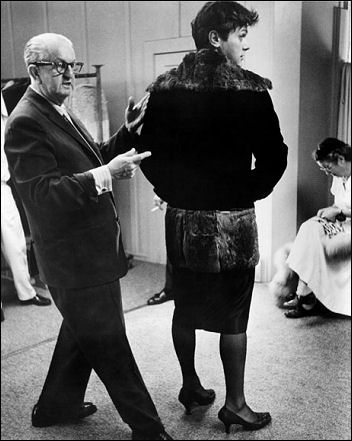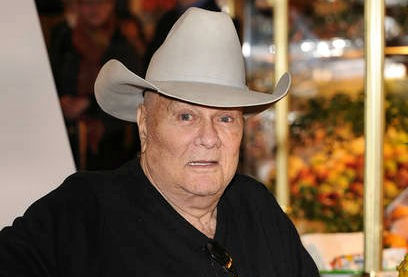The legendary Tony Curtis — the nervy, blunt-spoken Bronx street guy who had a great movie-star run from 1952 to 1968 or thereabouts — died of a heart attack last night about 9:25 Pacific. He was 85, and had lived a hell of a life — about 16 years at the top, and then a long active sunset that lasted 42 years.
Curtis was a decent painter, a raconteur, a legendary hound in his day (“I fucked Yvonne DeCarlo!) and an excellent fellow to hang and shoot the shit with.
In early ’00 I was Curtis’s temporary journalist “pal”. I liked him personally, knew all his good films, could recite a few of his memorable lines over they ears. I think the feeling was mutual. I wrote a good Reel.com piece about him called “Cat in a Bag” in March 2000.
Around the same time I arranged a meeting between Curtis and the staff of Falco Ink, so named as a tribute to Sydney Falco, Curtis’s legendary Sweet Smell of Success character. I once introduced him to my father, who gave him a book about Samuel Johnson. I once brought my mother and sons to a screening of Some Like It Hot at the American Cinematheque, and during his remarks to the crowd Curtis spotted me in the crowd and said, “Hi, Jeffrey.”
I told him once about my then 11 year-old son Jett wanting to dye his hair blue, and Curtis said, “Let him wear his hair blue…he’s a kid, so what? He’ll wear it blue and then he’ll move on to something else.” My ex-wife Maggie, who was voicing stern disapproval Jett about the hi, “You tell Tony Curtis to mind his own business!”
Here‘s an HE piece called “Curtis Burns On.”
“Tony Curtis’ Hollywood heyday is long gone,” I once wrote in my Reel.com column, “but there’s no mistaking the fact he’s always embodied a certain pugnacious cool [that’s] as palpable today as it was when Curtis was starting to come into his own as a serious actor, in the late 1950s.
“Forget all the cruddy movies he’s made over the last 20 years. And forget his smooth-talking seducer-stud roles, which he began playing in the early ’60s in big-studio disposables like Sex and the Single Girl, Boeing Boeing, The Great Race, and Not with My Wife, You Don’t!
“I’m talking Sidney Falco cool. A pensive, anxious, urban quality. You can see shades of it in Curtis’ saxophone-playing Joe in Some Like It Hot. In his performances in Lepke, The Outsider, The Defiant Ones, The Great Impostor. But especially noticeable in the erstwhile Mr. Falco — a profoundly scummy New York press agent he played in the blistering 1957 drama Sweet Smell of Success.
“Bluntness, ambition, class resentment, latent anger — these are fires that have always burned within Curtis, the man.
“I had coffee with the 74-year-old actor in March 2000, and it seemed to me they were still there. Their manifestation in Sidney Falco, when these stored-in-the-gut feelings were riper and more intense, made for a perfect match — the sort of synchronicity that happens once in a blue Hollywood moon.”
The only negative feeling I have about Curtis is that quote he gave to Fox News guy Bill McCuddy in early ’06 dissing Brokeback Mountain. He said “he hadn’t yet seen Brokeback Mountain and had no intention of doing so,” and claimed that other Academy members in his peer group felt the same.
“‘This picture is not as important as we make it,” Curtis said. “It’s nothing unique. The only thing unique about it is they put it on the screen. And they make ’em [gay] cowboys.’ Howard Hughes and John Wayne wouldn’t like it.’
With that quote, Curtis became (in my head, at least) the figurehead spokesperson for the Academy’s homophobic geezer faction, whose votes against Brokeback led to Crash winning the Best Picture Oscar.

“Here’s the final stretch from my March 2000 Reel.com interview piece:
“Today, there’s a wariness in Curtis. Something itchy, cautious, pent-up. I’ve noticed this in actors before. It means there’s all kinds of energy (rude, vulnerable, or otherwise) looking to get out, but they need the unreality of playing someone else to find the right pitch for it.
“I wouldn’t call Curtis pretentious or posturing. He’s likable, affable. He’s still looking to be flattered (as all actors are), but he doesn’t hesitate to make fun of himself, or admit to past failings or weaknesses.
“We met last Sunday at the Beverly Glen shopping center, just south of Mulholland Drive. I waved to him above the heads of several customers sitting outside a popular, packed delicatessen. Curtis waved me over and led me to the inside of a less-crowded Starbucks — fewer people, fewer stares.
“When he ordered coffee for both of us, the woman at the counter insisted on charging nothing. A small tribute to the legend. ‘Really?’ he said to her. ‘Well, thank you so much!’
“We talked about everything — politics, drug-dependency (Curtis had difficulties in this area during the ’80s), Burt Lancaster, old Hollywood, his website (tonycurtis.com, a venue for selling his paintings), women, new technologies, etc.
“He says there’s a large billboard of his youthful image near the corner of Sunset Boulevard and the 101 Freeway — painted by a local artist, he says. A nice little ego boost…or maybe a hint that things are coming around and old man Curtis might be in play again.

“At one point, I handed Curtis a list of his 120 films and asked him to check those he’s genuinely proud of. He checked a total of 18. He didn’t check The Vikings. He didn’t check The Outsider. He checked Houdini. Every film he made after Spartacus in 1960 up until 1968’s The Boston Strangler, he didn’t check. He checked his role as a pair of mafiosos — Louis ‘Lepke’ Buchalter in 1975’s Lepke and Sam Giancana in the 1986 TV movie Mafia Princess.
“Among his ‘notable TV guest appearances,’ Curtis checked only one — the voice role of ‘Stony Curtis’ in a 1965 episode of The Flintstones.
“Curtis looks good for his age. He’s had the usual touch-ups. His teeth are perfectly white. His features are naturally weathered, but more like a man 15 to 20 years younger. His eyes have a bright, inquisitive gleam. (I’ve seen a lot less of this quality in people 30 and 40 years younger.) He has a slight pot belly. His legs are well-toned. He has a cheerful smile. ‘Thank God at my age, I’m not sick,’ he says.
“But all the applications and polishings and youthful attitudes in the world can’t make time run more slowly.
“‘Can I tell you a story, Jeffrey?’ he said, about halfway through our talk. ‘In 1948, when I was 23 or 24, when I first came out here I lived in a house on Fountain Avenue. I rented a room there. And they had a swimming pool. I had an appointment and I got on a trolley car…they were running right down the middle of the freeway back then.
“‘Then I got back, I jumped into the pool, I took a shower, got dressed and got into the car, and drove up here to meet you. That’s how quick these 50-fucking-two years have gone…quick as that.'”









